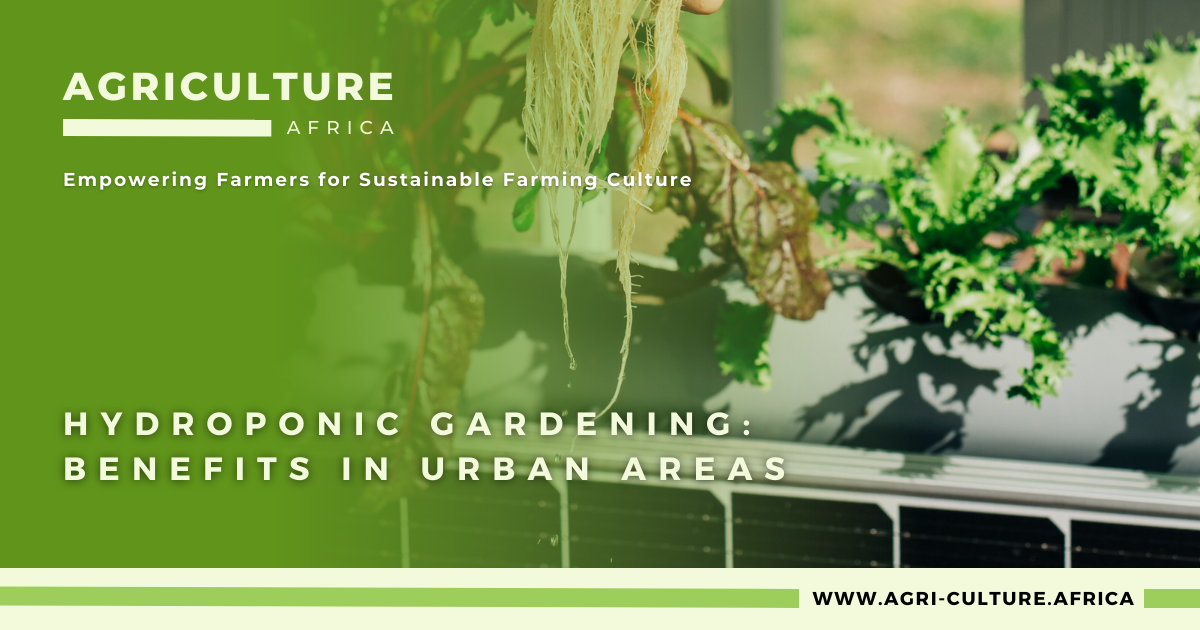
Empowering African Farmers for Sustainable Farming Culture
Hydroponic gardening is a method of growing plants that does not require soil and instead grows the plants in a nutrient-rich water solution. Hydroponic gardening in urban structures is typically done in vertical gardens or other indoor structures with limited space. Hydroponic gardens can be designed to grow a wide range of plants, such as vegetables, herbs, and fruits.
There are several advantages of hydroponic gardening for urban agriculture, including:
It is ideal for urban areas with limited space. Because hydroponic gardens do not require soil, they can be installed in a small indoor space such as a balcony or rooftop. Traditional soil-based gardening necessitates a lot of room for planting and growth. This is not always possible in cities where space is limited. In contrast, hydroponic gardening allows plants to be grown vertically, taking up less floor space. This is known as vertical farming, and it is becoming more popular in cities. Vertical farming employs stacked layers of plants grown in a controlled environment, making it ideal for densely populated urban areas.
Water is frequently wasted in traditional soil-based gardening as it seeps into the ground or evaporates into the air. In contrast, hydroponic gardening employs a closed system that recirculates water and nutrients. This means that, when compared to traditional gardening methods, water consumption can be reduced by up to 90%. Furthermore, hydroponic gardens can be located closer to a water source, reducing the need for transportation and distribution.
Because hydroponic farming does not require soil, it eliminates the risk of soil-borne diseases, which can be a problem with traditional farming methods. Traditional gardening, where plants are grown directly in soil, is rife with soil-borne diseases. These diseases spread quickly and easily, wiping out entire crops. However, because plants are not grown in soil in hydroponic gardening, there is no risk of soil-borne diseases. This makes hydroponic gardening a safer and more dependable way to grow crops, particularly in areas with poor soil quality.
Hydroponic farming has the potential to boost agricultural productivity by allowing farmers to grow crops in a controlled environment that can be optimised for maximum growth. This means that crops can be grown faster and with higher yields than with traditional farming methods, potentially increasing food production.
Hydroponic gardening has the potential to improve food security in Africa by allowing farmers to grow crops year round, regardless of weather conditions. This means that communities can have access to fresh produce even when traditional farming is impossible. Furthermore, hydroponic gardens can be used to grow high-demand crops, which can help farmers and their communities generate income.
Hydroponic gardening uses less water than traditional farming methods, making it an ideal solution for water-stressed areas. In Africa, where many communities lack access to water, hydroponic gardening can aid in the conservation of water resources, which are critical for many communities.
Hydroponic gardening is a sustainable agriculture practice that uses fewer resources and generates less waste than traditional farming methods. This makes it an ideal solution for African communities seeking to reduce their environmental impact and promote sustainable living.
By creating jobs and generating income, it can provide economic opportunities for African communities. Hydroponic gardening, for example, can generate jobs in areas such as construction, maintenance, and harvesting. Furthermore, hydroponic gardens can be used to grow high-demand crops, which can help farmers and communities generate income.
Hydroponic gardening in urban structures has numerous agricultural benefits, particularly in Africa. African communities can overcome many of the challenges that traditional farming methods present by embracing hydroponic gardening and creating a brighter future for themselves and their children.
Your donation fuels change! Help Agriculture Culture in Africa empower farmers with resources, training, and access to innovation. Together, we can revolutionize African agriculture.
Empowering Sustainable Growth and Innovation in African Agriculture
Sign up to our newsletter